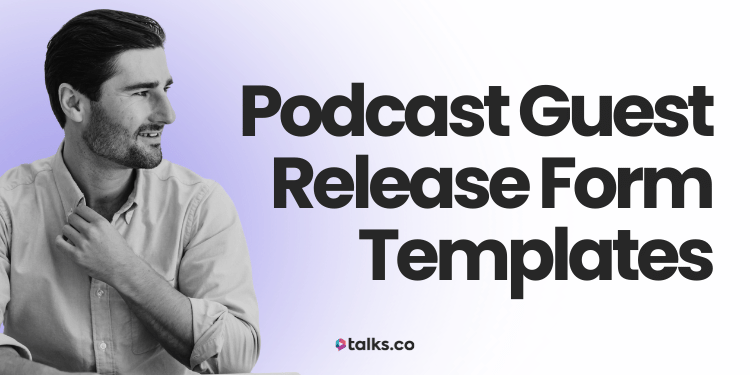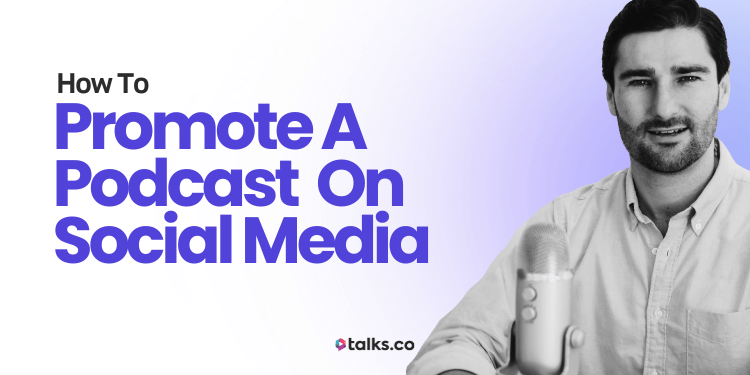Running a podcast sounds fun until the problems hit.
Guests change their minds. Episodes go missing. Someone doesn’t like an edit. Suddenly, that carefree “record and publish” vibe turns into a headache you didn’t sign up for.
I learned this the hard way.
When I started, I skipped podcast guest release forms. I firmly believed relationships and verbal agreements mattered more than paperwork. If a guest wanted their episode removed, I’d keep things friendly and roll with it.
Unfortunately, that only works until it doesn’t. Now? I never hit record without a podcast release form.
It’s not about being controlling, but because it protects your show, your content, your reputation, and your peace of mind. It keeps everything professional, clear, and stress-free.
In this guide, you’ll learn:
- What a podcast guest release form is
- Why every host actually needs one
- The key terms to include in the paperwork
- The best templates you can use today
- When and how to share it with guests
Think of this as your podcast safety net. Simple, legal, and practical.
What Is a Podcast Guest Release Form?
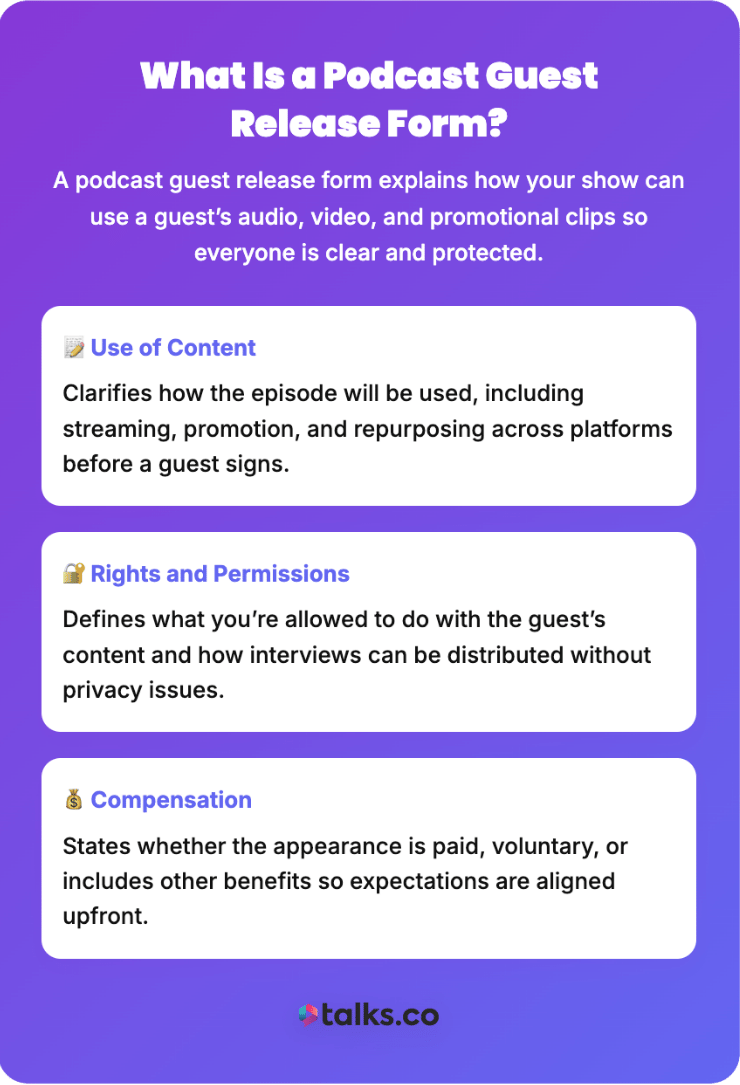
A podcast guest release form is a handshake with legal backup. A release form spells out how your podcast can use the content from a guest like audio, video, social clips, all of it, so everyone’s clear and protected.
Key terms to include
When you’re putting together your podcast guest release form, there are a few key details that need to be clear as day:
- Use of content: Make sure your guests understand how the episode will be used, e.g., streaming, promotion, repurposing before making your guest sign a podcast legal document.
- Rights and permissions: What you can do with the guest’s content and any specifics on how you can distribute your interview podcast to avoid invasion of privacy.
- Compensation: Paid, voluntary, or somewhere in between. Make sure to specify what, if any, compensation is provided so expectations are met.
Podcast Guest Release Form Template
A podcast guest release form is essential for ensuring a smooth, professional experience between you and your podcasting guest. It outlines the rights, responsibilities, and expectations for the use of content shared during the podcast.
Below is a simple yet effective template to get you started.
[Your Show Name] Podcast Guest Release Form
- Guest information: Name, email, phone number
- Show details: Show title, episode number
- Permission to use content: By signing this form, [Guest] grants [Your Show Name] the right to use the following content: Audio/video recordings, images, social media clips, and other promotional materials.
- Rights and usage: [Your Show Name] has the right to edit, distribute, and promote the content as deemed appropriate for the show’s objectives.
- Compensation: [If applicable] This appearance is [paid/voluntary].
- Terms and conditions: Cancellations or rescheduling requests may be submitted at least [X] days in advance. Any disputes will be governed by [Your Location] law.
- Signature: Guest signature and date.
5 Best Podcast Guest Release Forms
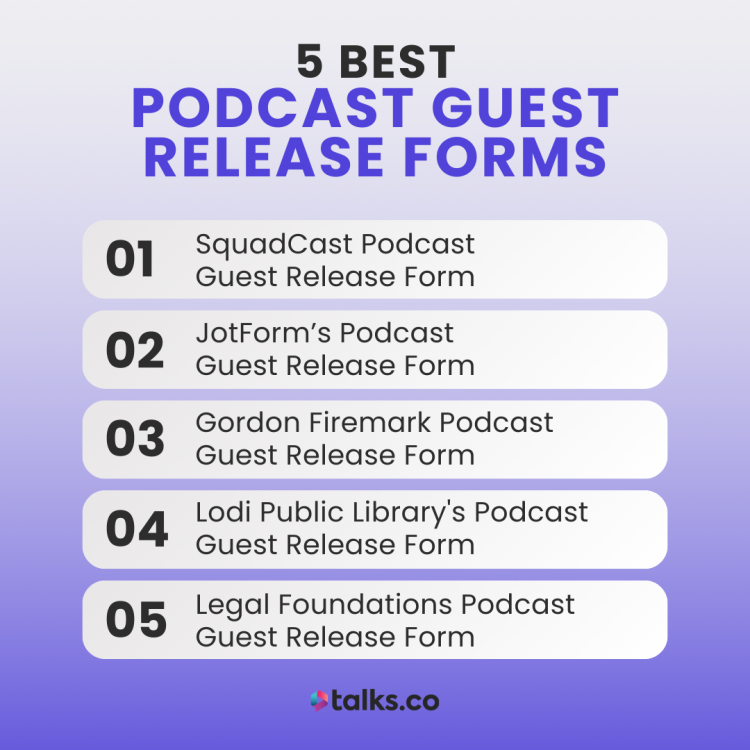
Below are tried-and-tested forms that have been used by hosts and guests alike.
1. SquadCast Podcast Guest Release Form Template
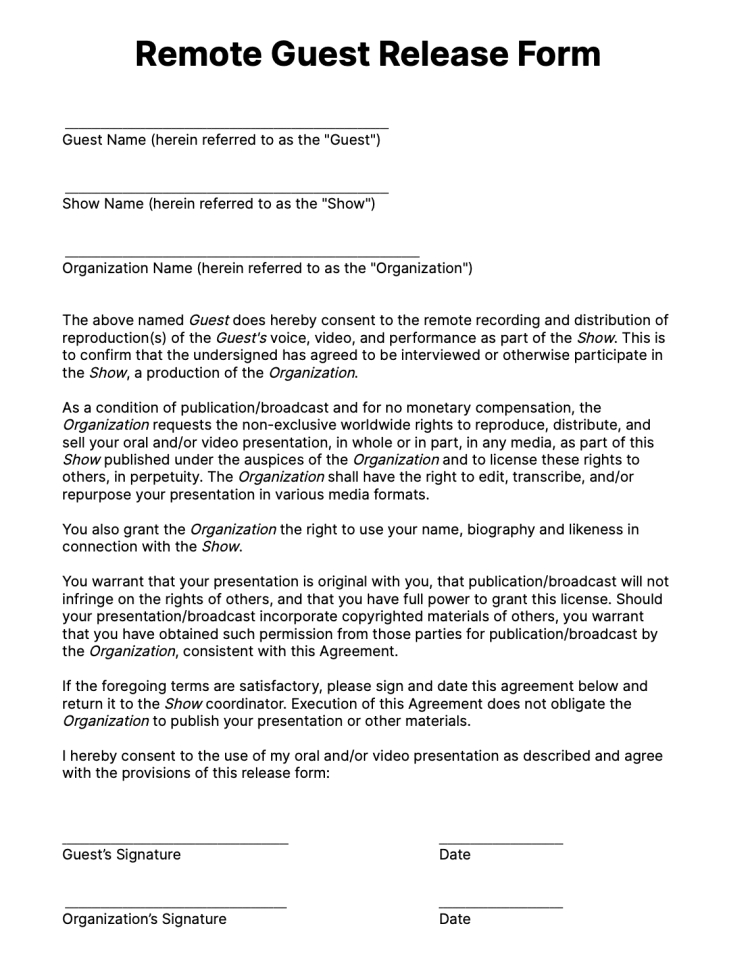
This podcast guest release form from SquadCast is a great option if you’re looking for a clean, straightforward release form. It keeps things simple while still covering everything you need.
2. JotForm’s Podcast Guest Release Form
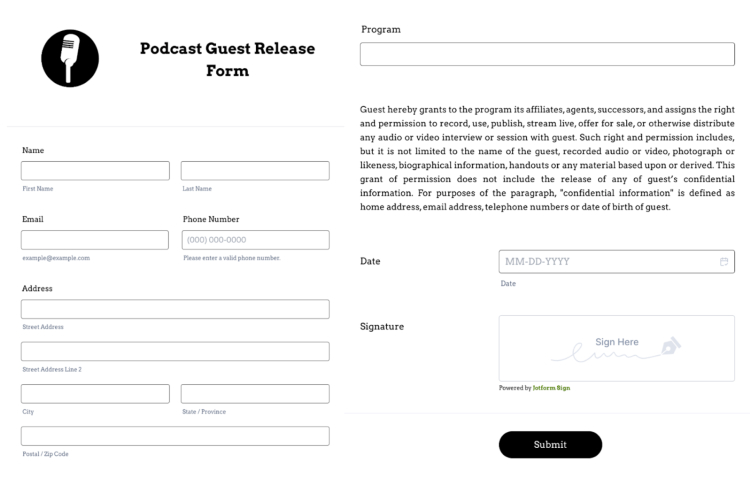
The JotForm podcast guest release form offers a sleek, user-friendly template that’s great for any podcast host looking to make the process easier for both themselves and their guests.
3. Gordon Firemark Podcast Guest Release Form
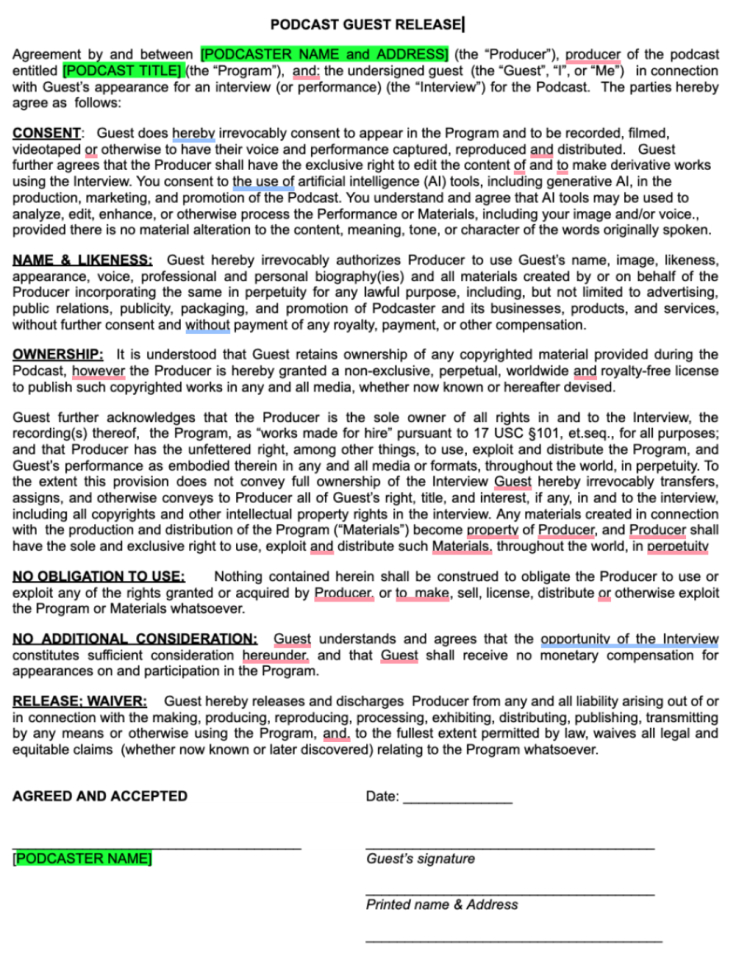
The Gordon Firemark podcast guest release form is great if you’re looking for something that’s legally robust and thorough. Firemark, a podcast lawyer, offers this template to ensure that every angle is covered legally.
4. Lodi Public Library’s Podcast Guest Release Form
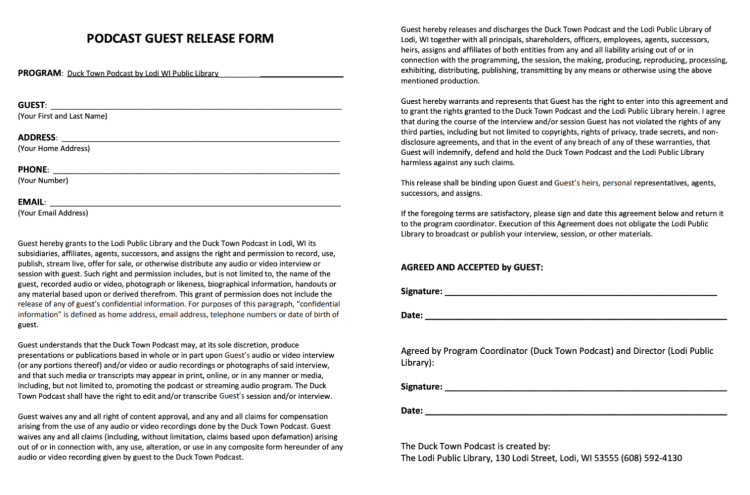
Lodi Public Library podcast guest release form offers a solid, no-nonsense approach to podcast guest releases. It’s especially useful for educational or non-commercial podcasts.
5. Legal Foundations Podcast Guest Release Form
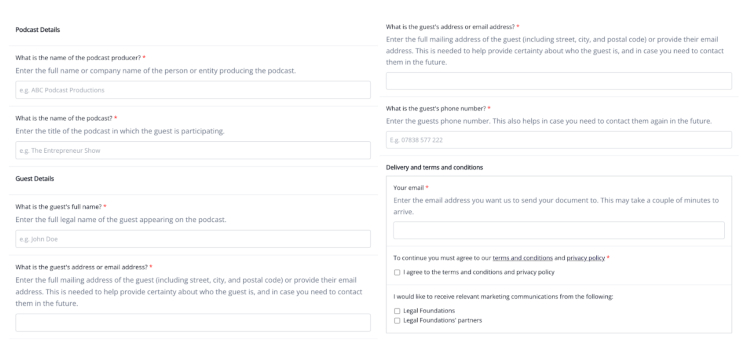
Legal Foundations podcast guest release form is another excellent legal template for those who want an airtight agreement for their podcasts. If you’re running a business or want to make sure your podcast is properly protected for future use, this one’s worth considering.
Do You Need a Podcast Guest Release Form?
If you have a podcast or plan to be a guest on one, you’ve probably heard about guest release forms. But do you actually need one? Short answer: yes.
When a guest release form is non-negotiable
Even the nicest guests can change their minds. A release form protects your content and your show. Here are a few situations where it’s an absolute must for your podcast guests to sign:
- Recording for public distribution: If the episode will be shared on platforms like Spotify or Apple Podcasts, a release form ensures you’re in charge of your content and have permission to use your guest’s content.
- Sensitive or controversial topics: Diving into hot episode topics? A release form is a simple way to protect you from potential disputes if the podcaster changes their mind after the audio recording.
- Collaborations or sponsored events: Brands and sponsors often require clear agreements to avoid a lawsuit for copyright infringement. A release form shows you’re serious about the success of your show.
- To monetize your podcast: Planning to use a podcast for ads, merchandise, or repurposed content? A written document makes it clear how their contribution will be used at any point in the future.
- Editing and creative control: Edits happen. A release form confirms you’ll be able to use a podcast episode and tweak the content at any point without endless back-and-forth approval requests on the final product.
What happens without a guest release form?
Skipping the paperwork might feel casual and easy, but it’s a bit like playing soccer without shin guards. You’re leaving yourself exposed.
- Guest regrets: Without written consent, you’ll have to comply with a guest’s request or make changes. Many podcasters can request you pull the episode. Or worse, take legal action if they feel misrepresented.
- Content ownership confusion: Who owns the content? Without a release form, you’re in murky waters, especially if the guest claims they didn’t agree to its distribution.
- Editing complaints: A guest might argue against edits they feel alter their message or the guest’s image. A release form spells out your rights to edit the content produced as needed.
- Loss of credibility: If disputes arise, it can damage your podcast’s reputation. A professional release form helps build trust with future guests.
Legal implications
Legal issues can sideline your show if you’re not careful. You always need a podcast guest to sign your form to avoid:
- Defamation: If a guest believes their words were twisted or bits of information were misrepresented, they could take you to court and a verbal agreement won’t stand up in court. A release form is a simple document that protects your content by securing consent upfront in case a guest objects or demands that you remove or edit their interview.
- Copyright violations: Did your former guest mention a book, song, or idea? If there’s no release form, they could sue for copyright infringement or make demands that the episode be taken down.
- Financial losses: Legal battles are expensive, and guests might end up demanding payment. Even if you’re in the right, defending yourself without a signed release form can cost a fortune in legal protection when you could just take the episode down.
- Platform compliance issues: Many podcast hosting platforms have terms of service requiring you to own the rights to all uploaded content. A release form helps you tick that box.
When to Share Your Podcast Guest Release Form
Deciding when to send the form depends on your workflow. Here’s a breakdown of options:
- Right after booking: This is the sweet spot for most podcasters. Your guest is already excited about the show after sending in their podcast guest application, so sending the release form feels like part of the guest onboarding process.
- After recording: Some guests may feel more comfortable signing after they know what’s been recorded. However, if the guest refuses to sign after recording, you’re stuck with an episode you can’t legally use.
- Before booking (rare): It’s not common, but for some cases where topics are sensitive, you might need the release signed before agreeing to record.
How to Create a Podcast Guest Release Form
Making a podcast guest release form is all about having a simple, clear agreement that protects both you and your guest.
Software options
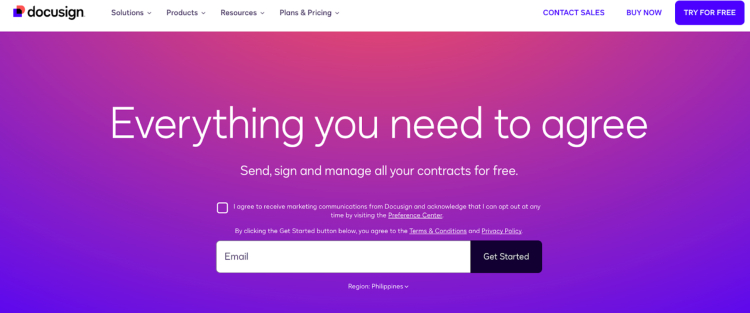
Go digital to save time and make the process to sign and return the form smoother for you and your guests. Here’s some software to consider:
- DocuSign: An industry favorite for legally binding e-signatures. You can upload your form, send it off, and get notified once it’s signed
- Google Forms: A free, easy-to-use option. Create a form, add fields for guest info, permissions, and signatures, and you’re good to go. Use the “Short Answer” field for names and emails, and include a “Check All That Apply” option for permissions.
- Typeform: If you want a slick, interactive form, Typeform is your go-to. It’s a bit more visually appealing than Google Forms, which can be nice if you’re aiming for a standout experience.
Examples of Podcast Guest Release Forms
When crafting a podcast guest release form, it’s important to consider the specific needs of different niches. Each example highlights how a well-crafted form can benefit both guests and podcast hosts.
Release form for business coaches
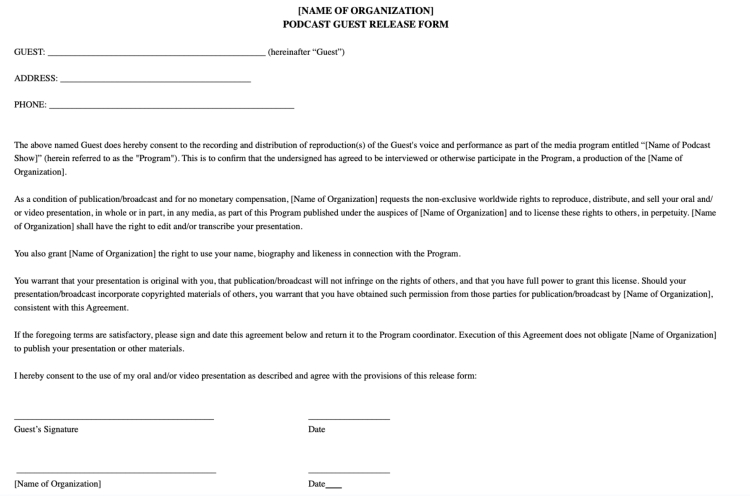
Business coaches often share proprietary strategies and personal anecdotes. A well-crafted release form like the Preserve This Podcast template ensures their insights are protected while granting your podcast the rights to distribute the episode.
Release form for health and fitness podcasts
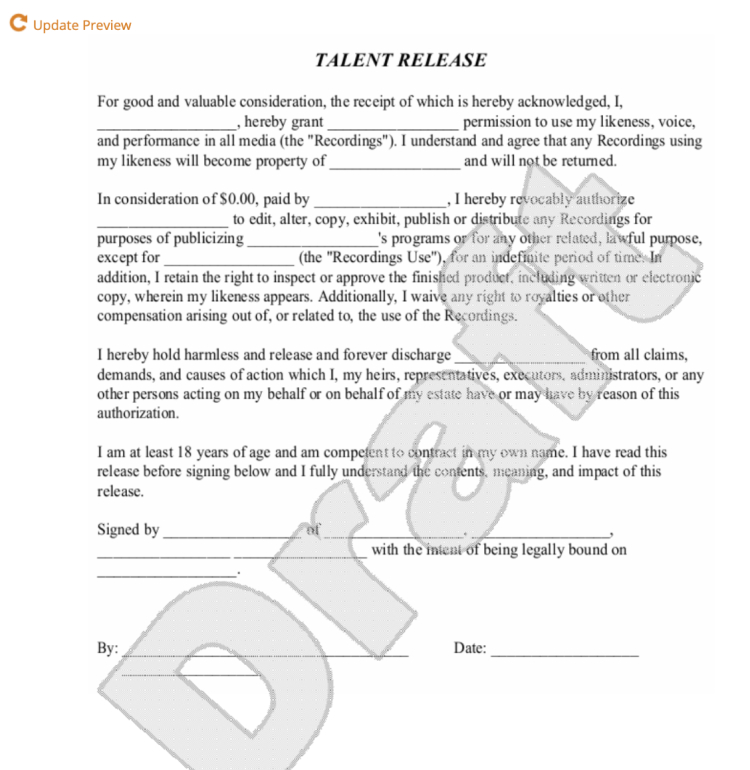
The Rocket Lawyer Talent Release Form is an excellent example of a simple, effective, and professional option. It covers permissions for likeness, voice, and performance while ensuring both parties have a clear understanding of rights and responsibilities.
Creative release form for storytelling shows
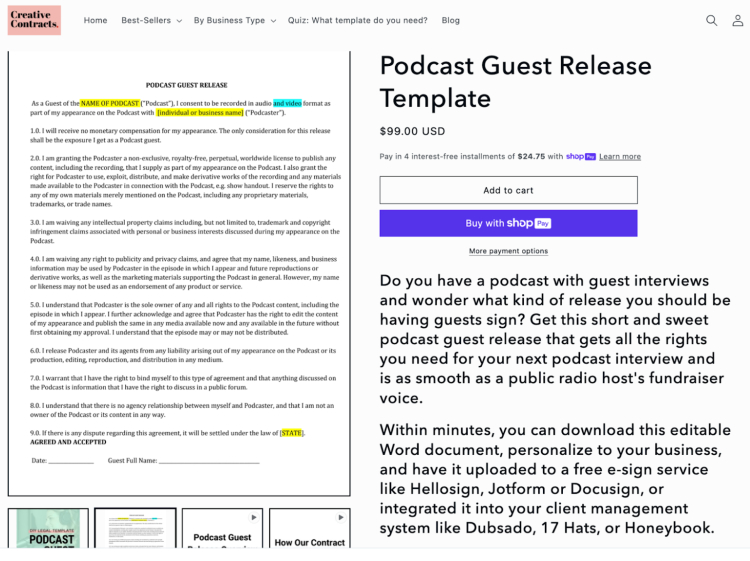
Storytelling podcasts thrive on unique narratives and creative expression. A tailored release form like Creative Contracts can address the specific needs of such shows, ensuring that the guest’s story can be shared freely while respecting their rights.
How to Find Podcast Guests
Finding the right guests for your podcast is about curating voices that will inspire, educate, and engage your audience. Here’s how to secure high-quality clients that fit your show’s vibe.
- Define your audience and niche: Start by getting crystal clear on your audience. Who are they? What do they care about? For example, if your podcast focuses on business coaching, look for guests who are crushing it in that space, whether it’s successful coaches, clients with amazing transformations, or thought leaders with unique insights.
- Leverage your existing network: Reach out to colleagues, past clients, or even former podcast guests. They’re more likely to say yes because they already know you and your show’s value.
- Craft an outreach program: Use Talks to be matched with guests. Personalization is key. If you’re doing cold outreach, here’s a template you can tweak: “Hey [Name], I’ve been following your work on [specific topic] and I’m a huge fan of [specific achievement]. I host a podcast called [Podcast name] where we [what your podcast does]. I’d love to feature you as a guest to share your insights on [specific topic]. Let me know if you’re interested, and I can send over more details!]”
- Use social media: Platforms like LinkedIn, Twitter, and Instagram are goldmines for finding guests. Use hashtags related to your niche or join relevant groups. For example, if your podcast is about health coaching, search for hashtags like #HealthCoachLife or #FitnessCoaching. Engage with their posts before reaching out.
- Tap into industry events: Virtual summits, webinars, and conferences are packed with experts looking for opportunities to expand their reach. Keep an eye on event speaker lists. These people are already comfortable sharing their expertise.
How to build strong guest relationships
Great guests come from how you show up before, during, and after the episode. Treat guests well, and you’ll build a network that fuels your podcast long-term.
- Start with value: Before you ask someone to be a guest, consider what’s in it for them. Can you promote their book, course, or project? Make it clear how appearing on your podcast will benefit them.
- Follow up and stay connected: After their episode airs, send a thank-you note and share the links to the episode. Tag them in your social media posts to boost their exposure. Building a long-term relationship can lead to referrals and repeat appearances.
- Be respectful of their time: High-quality guests are often busy. Be clear about your expectations upfront. How long the interview will take, the topics you’ll cover, and any prep work they might need to do.
Tools and platforms to discover ideal guests
If you want consistent, high-quality guests, you need systems. These platforms make it easier to find people who are actually a good fit for your show.
- Talks: Talks is like speed dating for podcasters and guests. You can find profiles, send pitches, and even schedule interviews directly through the platform. Bonus: it’s easy to filter by expertise and availability.
- LinkedIn: Use the search bar to find experts in your niche. For example, type “business coach” or “fitness expert” and filter by location or industry. Send them a connection request with a personalized note about why you’re reaching out.
- Facebook Groups: Talks Connect is the go-to spot for podcasters and experts to connect. Use #FindaGuest to promote your show or #BeaGuest to pitch yourself as a guest. Join the community to network, find opportunities, and grow your visibility.
Seal the Deal
A podcast guest release form isn’t the sexiest part of your podcast setup, but it’s absolutely essential.
By using one of the templates above or creating your own, you ensure that both you and your guest are clear on your rights, responsibilities, and what happens with the content once it’s recorded.
So don’t skip this part. It’s just part of playing the game right.
Don’t let opportunities pass you by. Find the perfect guests for your show and start getting booked today.
Sign up for your free Talks account!
